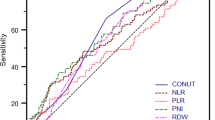Abstract
Background
Immune-nutritional status has been recently reported as a prognostic factor in hepatocellular carcinoma (HCC). The controlling nutritional status (CONUT) score has been established as a useful tool to evaluate immune-nutritional status. This study aimed to investigate the efficacy of the CONUT score as a prognostic factor in patients undergoing hepatectomy for HCC.
Methods
A total of 295 patients who underwent curative hepatectomy for HCC between January 2007 and December 2014 were retrospectively analyzed. Patients were divided into two groups according to the CONUT score. The impact of the CONUT score on clinicopathological, surgical, and long-term outcomes was evaluated. Subsequently, the impact of prognostic factors, including the CONUT score, associated with outcomes was assessed using multivariate analyses.
Results
Of 295 patients, 118 (40%) belonged to the high CONUT group (CONUT score ≥ 3). The high CONUT group had a significantly lower 5-year recurrence-free survival rate than the low CONUT group (27.9 vs. 41.4%, p = 0.011) and a significantly lower 5-year overall survival rate (61.9 vs. 74.9%, p = 0.006). In multivariate analyses of prognostic factors, the CONUT score was an independent predictor of recurrence-free survival (hazard ratio = 1.64, p = 0.006) and overall survival (hazard ratio = 2.50, p = 0.001).
Conclusions
The CONUT score is a valuable preoperative predictor of survival in patients undergoing hepatectomy for HCC.


Similar content being viewed by others
References
Bray F, Ren JS, Masuyer E et al (2013) Global estimates of cancer prevalence for 27 sites in the adult population in 2008. Int J Cancer 132:1133–1145
Forner A, Llovet JM, Bruix J (2012) Hepatocellular carcinoma. Lancet 379:1245–1255
Huitzil-Melendez FD, Capanu M, O’Reilly EM et al (2010) Advanced hepatocellular carcinoma: which staging systems best predict prognosis? J Clin Oncol 28:2889–2895
(1998) A new prognostic system for hepatocellular carcinoma: a retrospective study of 435 patients: the Cancer of the Liver Italian Program (CLIP) investigators. Hepatology 28:751–755
Llovet JM, Brú C, Bruix J (1999) Prognosis of hepatocellular carcinoma: the BCLC staging classification. Semin Liver Dis 19:329–338
Onodera T, Goseki N, Kosaki G (1984) Prognostic nutritional index in gastrointestinal surgery of malnourished cancer patients. Nihon Geka Gakkai Zasshi 85:1001–1005 Article in Japanese
Pinato DJ, North BV, Sharma R (2012) A novel, externally validated inflammation-based prognostic algorithm in hepatocellular carcinoma: the prognostic nutritional index (PNI). Br J Cancer 106:1439–1445
Chan AW, Chan SL, Wong GL et al (2015) Prognostic nutritional index (PNI) predicts tumor recurrence of very early/early stage hepatocellular carcinoma after surgical resection. Ann Surg Oncol 22:4138–4148
Okamura Y, Ashida R, Ito T et al (2015) Preoperative neutrophil to lymphocyte ratio and prognostic nutritional index predict overall survival after hepatectomy for hepatocellular carcinoma. World J Surg 39:1501–1509. doi:10.1007/s00268-015-2982-z
Ignacio de Ulíbarri J, González-Madroño A, de Villar NG et al (2005) CONUT: a tool for controlling nutritional status. First validation in a hospital population. Nutr Hosp 20:38–45
Iseki Y, Shibutani M, Maeda K et al (2015) Impact of the preoperative controlling nutritional status (CONUT) score on the survival after curative surgery for colorectal cancer. PLoS ONE 10:e0132488
Sadamori H, Yagi T, Shinoura S et al (2013) Risk factors for organ/space surgical site infection after hepatectomy for hepatocellular carcinoma in 359 recent cases. J Hepatobiliary Pancreat Sci 20:186–196
Japan LCSGo (2010) General rules for the clinical and pathological study of primary liver cancer, 3rd English edn. Tokyo
Clavien PA, Barkun J, de Oliveira ML et al (2009) The Clavien-Dindo classification of surgical complications: five-year experience. Ann Surg 250:187–196
Tanriverdi O (2014) A discussion of serum albumin level in advanced-stage hepatocellular carcinoma: a medical oncologist’s perspective. Med Oncol 31:282
Xiao WK, Chen D, Li SQ et al (2014) Prognostic significance of neutrophil-lymphocyte ratio in hepatocellular carcinoma: a meta-analysis. BMC Cancer 14:117
Sun XD, Shi XJ, Chen YG et al (2016) Elevated preoperative neutrophil-lymphocyte ratio is associated with poor prognosis in hepatocellular carcinoma patients treated with liver transplantation: a meta-analysis. Gastroenterol Res Pract 2016:4743808
Hu B, Yang XR, Xu Y et al (2014) Systemic immune-inflammation index predicts prognosis of patients after curative resection for hepatocellular carcinoma. Clin Cancer Res 20:6212–6222
Jia Y, Zeng Z, Li Y et al (2015) Impaired function of CD4 + T follicular helper (Tfh) cells associated with hepatocellular carcinoma progression. PLoS ONE 10:e0117458
Nagai S, Abouljoud MS, Kazimi M et al (2014) Peritransplant lymphopenia is a novel prognostic factor in recurrence of hepatocellular carcinoma after liver transplantation. Transplantation 97:694–701
Wang M, Li C, Wen TF et al (2016) Postoperative low absolute lymphocyte counts may predict poor outcomes of hepatocellular carcinoma after liver resection. Chin Med J (Engl) 129:536–541
Lee YL, Li WC, Tsai TH et al (2016) Body mass index and cholesterol level predict surgical outcome in patients with hepatocellular carcinoma in Taiwan—a cohort study. Oncotarget 7:22948–22959
de Ulíbarri Pérez JI, Fernández G, Rodríguez Salvanés F et al (2014) Nutritional screening; control of clinical undernutrition with analytical parameters. Nutr Hosp 29:797–811
Kritchevsky SB, Kritchevsky D (1992) Serum cholesterol and cancer risk: an epidemiologic perspective. Annu Rev Nutr 12:391–416
Colecchia A, Schiumerini R, Cucchetti A et al (2014) Prognostic factors for hepatocellular carcinoma recurrence. World J Gastroenterol 20:5935–5950
Shah SA, Cleary SP, Wei AC et al (2007) Recurrence after liver resection for hepatocellular carcinoma: risk factors, treatment, and outcomes. Surgery 141:330–339
Kondrup J, Rasmussen HH, Hamberg O et al (2003) Nutritional risk screening (NRS 2002): a new method based on an analysis of controlled clinical trials. Clin Nutr 22:321–336
Kyle UG, Kossovsky MP, Karsegard VL et al (2006) Comparison of tools for nutritional assessment and screening at hospital admission: a population study. Clin Nutr 25:409–417
Author information
Authors and Affiliations
Corresponding author
Ethics declarations
Conflict of interest
The authors of this manuscript have no conflicts of interest to disclose.
Rights and permissions
About this article
Cite this article
Takagi, K., Yagi, T., Umeda, Y. et al. Preoperative Controlling Nutritional Status (CONUT) Score for Assessment of Prognosis Following Hepatectomy for Hepatocellular Carcinoma. World J Surg 41, 2353–2360 (2017). https://doi.org/10.1007/s00268-017-3985-8
Published:
Issue Date:
DOI: https://doi.org/10.1007/s00268-017-3985-8




